Giving back on safari
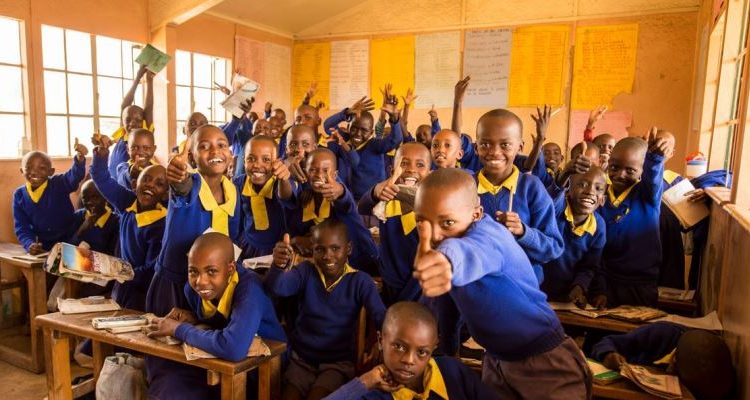
Recent chat around tourism has suggested people will want to travel more ethically and sustainably in a post-Covid world, and while it’s undeniable that you’ll have to burn some carbon to get to Africa, there are myriad ways of supporting this wish when you actually arrive.
Our choice at Aardvark Safaris has always been to work with the smaller camps and lodges, frequently owner run, who are vital supporters – often instigators or founders – of local projects and businesses. If you’re keen to travel in a responsible way and to give back on your safari we will happily advise where your stay can make a big difference. For now, we’ve taken a look at some of the wonderful things started or supported by a selection of the camps and lodges we love to recommend.
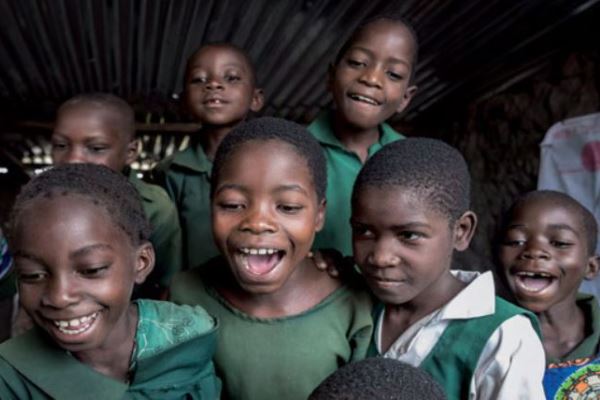
Disadvantaged students helped through education courtesy of Time + Tide Foundation
Almost all those we work with provide support for their local communities and a proportion of the cost of your safari goes towards funding these projects. Among companies who run a handful of lodges and safari camps, Robin Pope Safaris, Great Plains, Wilderness Safaris, and Time + Tide all have notable sustainability, conservation and community support credentials.
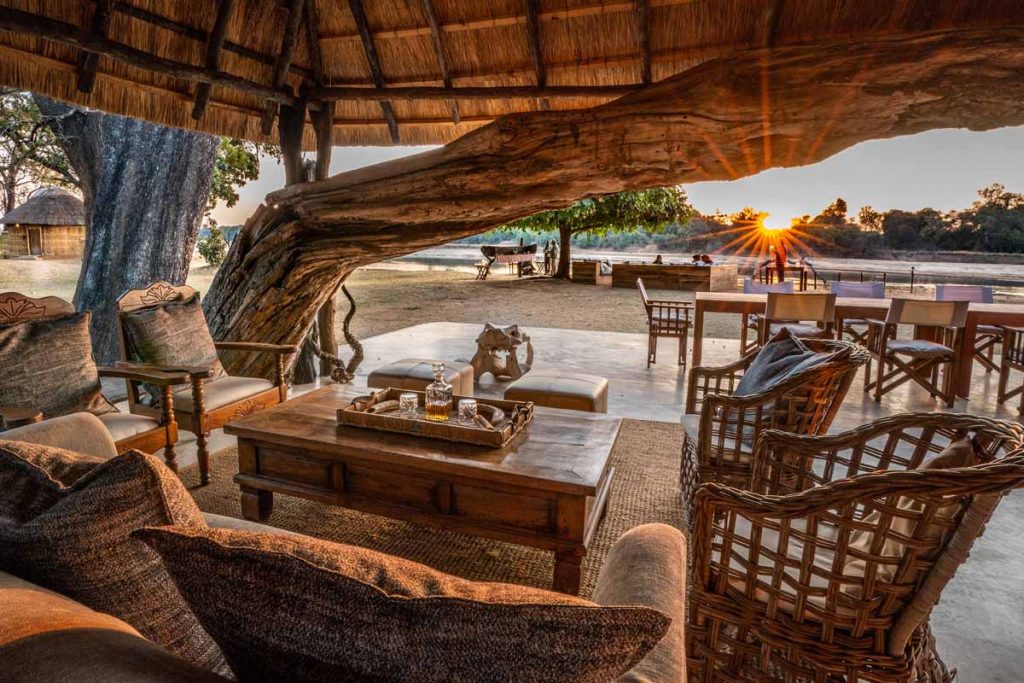
Time + Tide Mchenja Lodge on the banks of the Luangwa River
It’s not just safari lodges; many beach properties follow the same route. Azura offers some of Africa’s ultimate private luxury hideaways but they’ve backed up the ‘eco-chic’ ethos with proven conservation projects. Their Azura Rainbow Fund is the first registered charity of its kind in Mozambique and supports a variety of social and environmental projects from building schools to environmental projection initiatives.
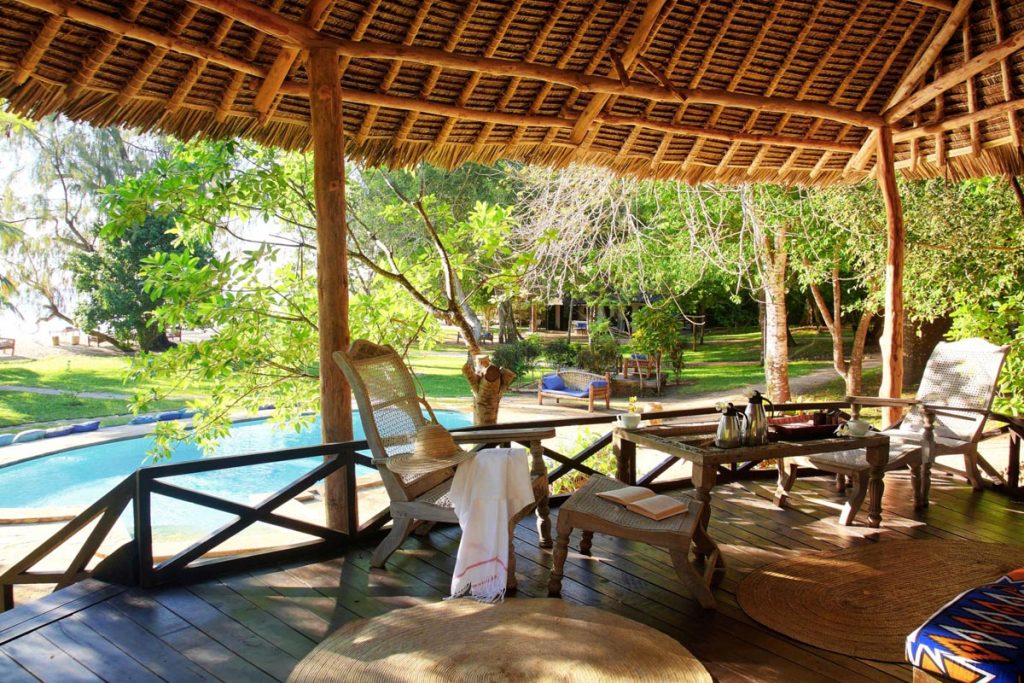
Pool, gardens and beach at Kinondo Kwetu
The villages close to Kinondo Kwetu, one of our favourite Kenyan beach lodges, have an average income among the lowest in Kenya. So the lodge set up the Kinondo Kwetu Trust and built the Kinondo Medical Centre in 2008, significantly improving the general health of the local community. Sponsorships now offer local children the opportunity to attend high school and funds go to the primary school to ensure nursery children are served food.
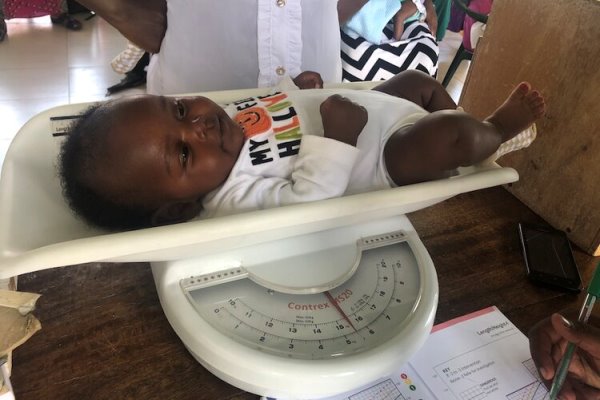
A weigh in at one of the twice-weekly baby days at the Kinondo Kewtu Medical Centre
Many provide some form of health support for their staff and local communities but two stand-out ventures are those from Campi Ya Kanzi and Ol Malo. Campi Ya Kanzi owners, Luca and Antonella Belpietro, founded the Maasai Wilderness Conservation Trust in 2000. This partnership between professional conservationists and young Masai leaders has shown that the Masai community and the wilderness in which they live can thrive with wise management.
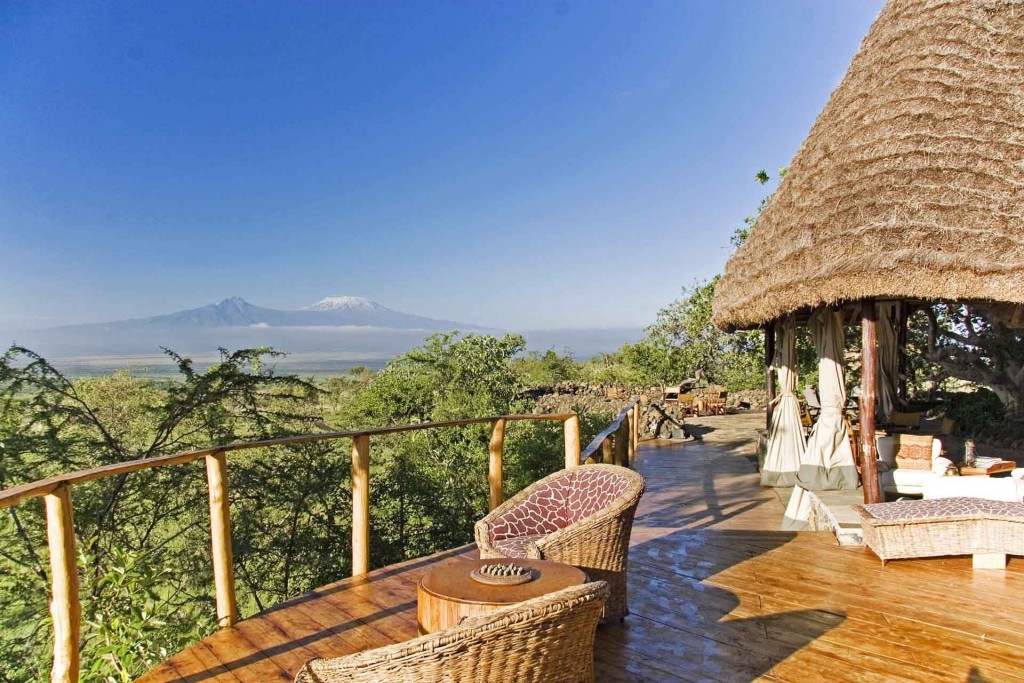
Glorious views across the plains towards Mount Kilimanjaro from the deck at Campi ya Kanzi
There are many notable wildlife achievements but it’s the health programme that really catches the eye. In 2018 the mobile health clinic covered some 5,000km and saw over 16,500 patients; a remarkable feat in Kenya’s beautiful, but remote, Chyulu region.
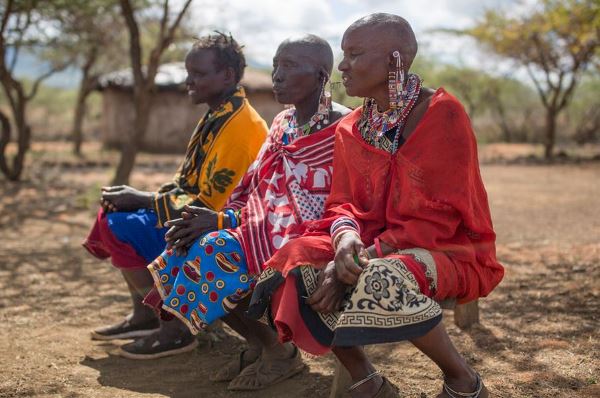
Masai ladies waiting at the Maasai Wilderness Conservation Trust clinic
Set up in 1992 is the internationally recognised Samburu Trust. The brainchild of the Francombe family who own and run Ol Malo in Kenya’s northern Laikipia region – it is supported by simply staying at the lodge as well as by guests’ donations. What started with just a handful of women and children now covers over one million acres of Samburuland with nomad schools, a thriving bead workshop, water reservoirs and wildlife conservation. Again, it’s a health issue that’s particularly heart-warming. Back in 2000 it was recognised that over 80% of the community was suffering from trachoma – a blinding eye disease transmitted by flies. Through preventative measures, mobile clinics and the intimate knowledge of migrations and Samburu culture, sight was returned to over 500 people and the trust has successfully eradicated the disease from nearby pastoralist communities too.
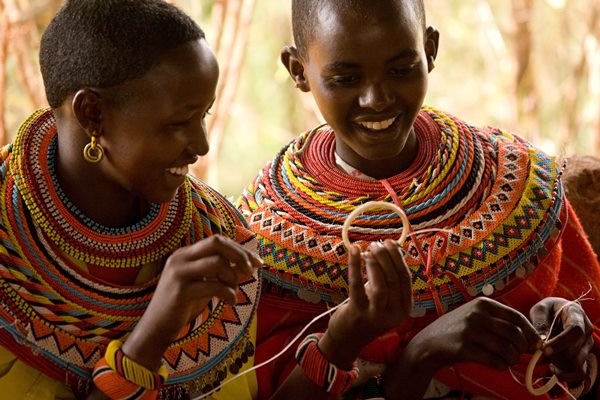
Samburu ladies at the Ol Malo bead workshop
Even something as simple as curio shopping will help. So rather than leave present buying for the airport, we’d suggest investigating some of the some lovely options which give back to the local communities. Ask us for ideas before you travel and we can advise you. To whet your appetite, here are two wonderful examples.
Many of the safari camps in Zambia’s South Luangwa Valley support Tribal Textiles, a home décor company just on the edge of the national park. By providing employment and income in an area where jobs are scarce, the small local community is supported way beyond just the workforce itself. Many employees have been with the company for over a decade, and over a third – in a challenge to the gender norms in the area – are female. With the reinvestment of 5% of each purchase into local community and conservation initiatives, Tribal Textiles supports many local organisations including the local Malimba primary school and Hanada Orphanage. It’s a ‘must do’ stop on your way into camp or back to the airport at Mfuwe, with a lovely collection of table and bed linen, carved goods, aprons, bags and T Shirts to browse through. A new addition is face masks – offering a bit of colour that we could all do with at the moment!
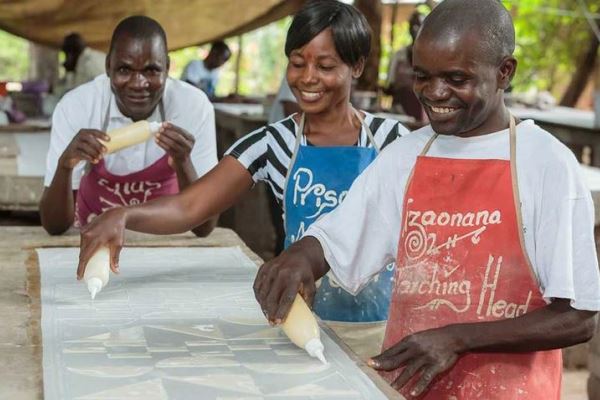
The Tribal Textiles team in their workshop just outside the South Luangwa National Park
Katundu was founded in 2006 by Suzie Lightfoot, whose family turned Kaya Mawa into one of Lake Malawi’s most wonderful lake-side lodges. With the objective of empowering women through artisanal training and a sustainable income, Katundu now employs a permanent team of over 30, of whom about three quarters are ladies related to the local orphan programme. In an area where opportunities are scarce, employment here offers a lifeline through a loan scheme, medical support and education fees for staff children.
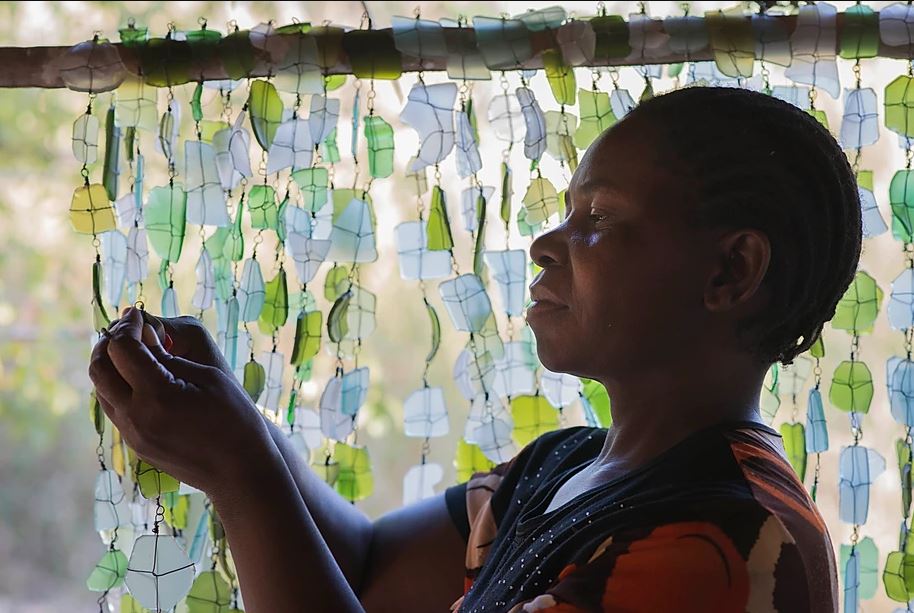
One of the Katundu ladies at work
The workshop on Likoma Island is just a short distance from the lodge, and guests are welcome to visit. It’s a veritable treasure trove, with exquisite glass chandeliers and beaded lampshades, beautiful hand-beaded textiles (which is where the business really started) and a range of quirky wooden goods all crafted from old sunken fishing boats and canoes. Their pieces are commissioned for hotels and private homes all over the world – a very special way to bring a touch of Africa back home!
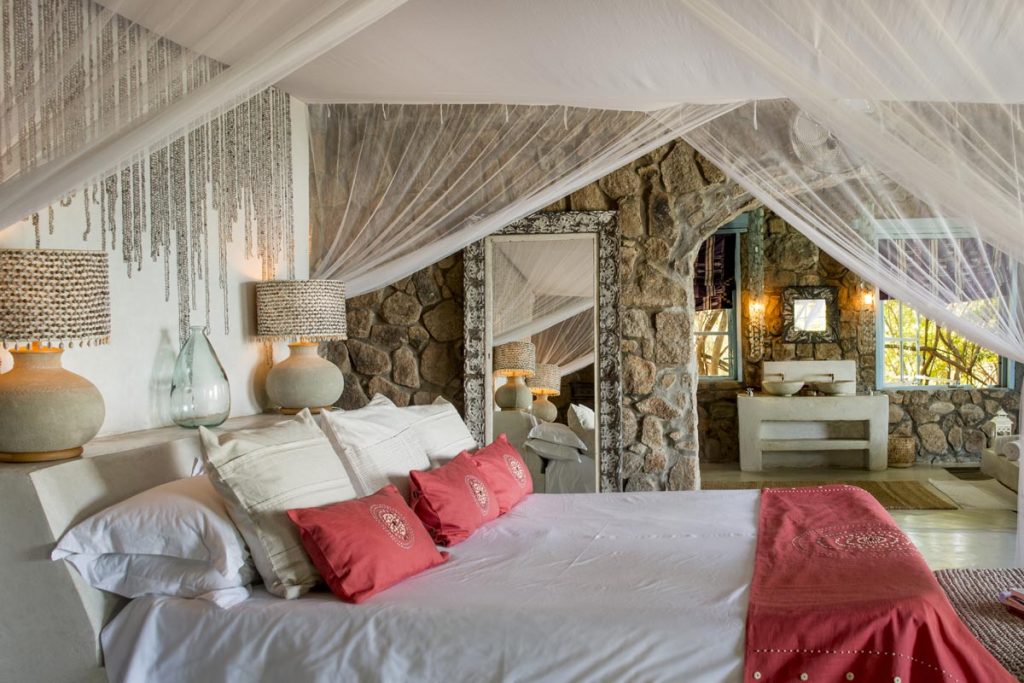
Accommodation at Kaya Mawa showcasing some of Katundu’s textiles and lampshades
It would be easy to write several blogs covering this subject, there are so many fabulous projects to highlight. If what we have mentioned here has struck a chord with you, we would be delighted to share more details of the work carried out across the countries in which we sell safaris.
What next?
If we have inspired you to dream about future safaris, please do get in touch – we would be delighted to chat, no matter how early in the decision making process you might be. Email is probably the best way to contact us right now and we’ll respond as quickly as we can – usually on the same day. We very much look forward to talking to you.
Leave a Reply